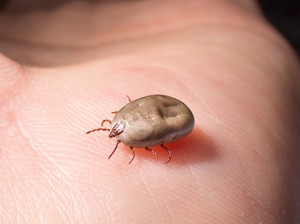AKC Canine Health Foundation Awards Grants to Study Tick-Borne Diseases in Dogs
 The AKC Canine Health Foundation (CHF), a nonprofit organization whose mission is to prevent, treat and cure diseases in all dogs, announces a second round of new grants awarded through its Tick-Borne Disease Initiative. This comprehensive Initiative addresses important health concerns that include Lyme disease, bartonellosis, and ehrlichiosis, through much-needed research in diagnostics, disease pathogenesis and prevalence.
The AKC Canine Health Foundation (CHF), a nonprofit organization whose mission is to prevent, treat and cure diseases in all dogs, announces a second round of new grants awarded through its Tick-Borne Disease Initiative. This comprehensive Initiative addresses important health concerns that include Lyme disease, bartonellosis, and ehrlichiosis, through much-needed research in diagnostics, disease pathogenesis and prevalence.
Edward B. Breitschwerdt, DVM, DACVIM, of North Carolina State University, will study “Enhanced Testing for the Diagnosis of Bartonellosis in Dogs.” Bartonellosis is a potentially life-threatening zoonotic disease distributed throughout the world by approximately ten different Bartonella bacteria species. Bartonella bacteria are transmitted to dogs and humans by ticks, fleas, lice, mites, and sand flies. Due to a lack of sensitive and reliable diagnostic tests, definitive diagnosis of bartonellosis in dogs remains a significant problem. Because these bacteria invade cells and infect tissues throughout the body, this chronic intracellular infection is difficult to cure with currently used antibiotic regimens. Dr. Breitschwerdt and his team aim to develop improved blood tests for bartonellosis in dogs that can also be used for world-wide sero-epidemiological prevalence studies, and to establish early and accurate diagnosis.
Pedro Paul Diniz, DVM, PhD, of Western University of Health Sciences, will study “Broad-Range Detection of Canine Tick-Borne Disease and Improved Diagnostics Using Next-Generation Sequencing.” Currently available tests for vector-borne diseases in dogs rely on previously known DNA sequences of each pathogen, with little room for detecting new or emerging organisms. This results in false negatives for tick-borne diseases, leaving veterinarians and dog owners frustrated by a lack of definitive diagnosis. Using an innovative approach, Dr. Diniz and team will employ next-generation sequencing (NGS) to overcome the limitations of current diagnostic technology. Testing samples from dogs naturally exposed to tick-borne diseases, NGS will detect not only new organisms but also characterize genetic differences among known organisms. The resulting dataset of a large number of DNA sequences of known tick-borne organisms and previously undetected organisms in naturally-infected dogs will support the development of diagnostic tools to simultaneously advance canine and human health.
In addition to these two new grants, earlier this year the AKC Canine Health Foundation awarded three grants through its Tick-Borne Disease Initiative. The three grants address Lyme disease, vector-borne disease testing for canine blood donors, and ehrlichiosis.
Funding for CHF grants comes from a number of sources, including: corporations, dog clubs, and individuals who are committed to the betterment of canine health through scientific research. During 2016, all donations to the Tick-Borne Disease Initiative are being matched dollar-for-dollar by the American Kennel Club (up to $250,000). Make an impact and double your donation today:www.akcchf.org/ticks.
Short URL: http://caninechronicle.com/?p=108927
Comments are closed











